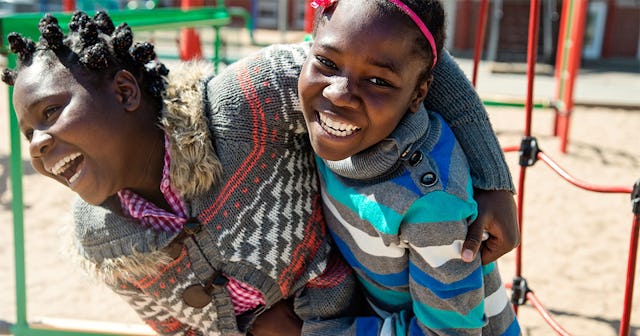There’s Never Been A Better Time To Make Recess Longer, So Let's Do It

My daughter’s only been in school for a week, but we’ve already settled into a routine. I drop her off every morning at 8. She waits, with a health screening in one hand and lunch in the other. I go home and work. On an ambitious day, I exercise, and then I pick her up. I ask her about her day. And do you know what she says? Do you know what she talks to me about first? She tells me stories of recess. Of the time she spent running and jumping and playing with her friends.
Of course, it makes sense. My daughter is in elementary school, and play is pivotal to her development. It is the highlight of her little life. But I am discouraged when I hear her speak because recess is an afterthought in her school. She gets just twenty minutes. A third of an hour. A fraction of a day. And it isn’t enough, not yesterday, not today, and certainly not in 2021 — when kids are experiencing an unprecedented amount of stress and feeling overwhelmed, worried, and unsure.
“The ongoing stress, fear, grief, uncertainty created by COVID-19 pandemic has weighed on all of us, but many children and teens have had an especially tough time,” an article on Healthy Children — a website powered by the American Academy of Pediatrics — says. “An estimated 40,000 children in the United States have lost a parent to COVID-19, for example. Many families have also lost financial stability during the pandemic. [And,] at the same time, children have had vital supports including school, health care services, and other community supports interrupted by the pandemic.”
Annie Otzen/Getty
In short, today’s children have been through the proverbial wringer. They need normalcy, stability, play — yes, play — and support.
“Recess… gives [children] the benefit of experiencing fresh air and sunshine, both noted for increasing overall health and mood,” Marie Conti, the head of The Wetherill School and member of the American Montessori Society board of directors, tells Rasmussen University. It supports their emotional development and mental health, giving them a chance to act freely and creatively — and to interact with their peers and friends — and recess reduces stress. According to a study published in Pediatrics, the official journal of the American Academy of Pediatrics, recess offers children a socially structured means for managing stress.
“Recess offers cognitive, social, emotional, and physical benefits that may not be fully appreciated,” the AAP continues. “Recess is necessary for the health and development of children and should never be withheld for punishment or for academic reasons.”
There are other benefits of recess, too. According to Rasmussen University, physical activity improves brain function. Research has shown positive links between people who exercise regularly and their cognitive ability. It combats childhood obesity, a condition which affects one out of five school-aged children. And (unsurprisingly) when kids have recess they are better behaved.
Fran Polito/Getty
A study from the Albert Einstein College of Medicine found that children who received 15 minutes of recess a day (or more) behaved better in class than those who did not.
Plus, recess is just fun. It is a time of joy, when kids can be kids and run without regard — though kids learn other skills on the playground. Yes, a great deal of development can (and does) happen during these unstructured intervals. They learn life lessons outside of the classroom and beyond the books.
“Children learn valuable communication skills, including negotiation, cooperation, sharing, problem-solving, and coping skills, such as perseverance and self-control, an article by Peaceful Playgrounds states. “[They] gain the opportunity to practice social skills and role-play with peers,” and children get to rest and (as mentioned) de-stress.
Recess is an important outlet for children of every age. It helps them be better, smarter, more patient little people.
So what can we do to ensure our children get recess? How can we advocate for longer play? We can reach out to elected officials, citing not just our opinion on the matter but the facts — i.e. there are numerous benefits to recess and both structured and unstructured play. We can attend board meetings and PTA meetings and come to the defense of our children. Starting “close to home” may — in some cases — does the trick. And we can encourage play both before and after school. I let my daughter run around the courtyard with her friends until they close the gates. Because kids need to be and breathe. Kids need recess — and breaks.
This article was originally published on